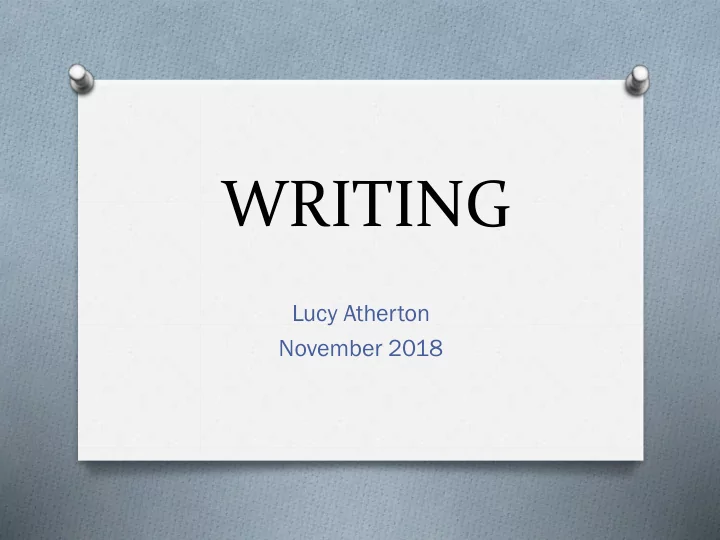

WRITING Lucy Atherton November 2018
How is Writing taught? O Daily English lesson O Opportunity to write longer pieces O Guided Reading sessions O Spellings O Independent reading O Handwriting O Speaking and Listening opportunities (drama)
Progression Through Teaching We teach in genres of writing that fall mainly into these main categories: • Narrative • Poetry • Non-fiction
How do we start? We start with a stimulus which is always based on a high quality text: • A book (fiction or non-fiction) • Poem • An excerpt from a book • Literacy areas are based on genre/ text
O Literac eracy areas as Year 6 – The Giant’s Necklace and other stories by Michael Morpurgo
Lit iter eracy cy area eas Y5 – George’s Marvellous Medicine
Literacy eracy areas s Year 4 – Greek Myths
Literacy acy areas as Year 3 – Flat Stanley
Immersion into a text Text Drama Visit/ Text experience
Getting into it!! • We prepare the children before they write and we will do this by: • Engaging the children through an immersion into a text (drama, visits, creating settings/ hot-seating characters) • Lots of talk for writing/ group/ paired work • Collecting words/ phrases and turning them sentences.
Then what? Now comes the process of reading… Reading a text that will support their • writing (modelling). In guided reading children will read • texts that are similar in genre and will be suited to their ability. Developing an understanding of the • text beyond the ‘reading’ of it (inference).
Where’s the writing? The writing comes very much at the end. By this point the children are well prepared to produce a piece of writing of a high level. They will have learnt new words and phrases; worked on punctuation and sentence structure and studied examples and discussed them.
Handout O Start to end progression O Y6 immersion, learning, spellings, sentence work, extended write, edited piece, written up and published
Areas our children cover Speaking 1) Listening and responding 2) Group discussion and interaction 3) Drama 4) Word recognition, decoding (reading) and 5) encoding (spelling) Word structure and spelling 6)
Understanding and interpreting texts 4) Engaging and responding to texts 5) Creating and shaping texts 6) Text structure and organisation 7) Sentence structure and punctuation 8) Presentation – Publication 9)
Writing as a Creative Process • This is a vital part of learning to write, as being creative engages children’s interest. • Making writing helps children to understand how important writing is in everyday life and how being able to express yourself in writing is crucial for so many things.
Helping your children at home….
Talk isn’t cheap…It’s free!! Start where they are at… • What are they interested in? Exploit it! • Talk to them about it… • Encourage them to have an opinion and express it giving examples to back it up. • Make sure you stay interested be a good audience to them…
Writing… not easy! My tip is make it real… • Thank you letters • Lists: Christmas, birthdays and shopping. • Post cards on holiday • Diary (maybe just for a holiday)
Having an opinion… • Letters of persuasion… Good to have an opinion and use it to improve our society.
Making it real! • Emails to relatives or friends.
Reading… • Reading books: • Fiction: Mr Gum, Roald Dahl, Jaqueline Wilson, collections of short stories. • Michael Morpurgo
Non-fiction: • Just as important as fiction. • Tends to be forgotten but is just as important…
Helping my child read… • It’s not a chore if you fit in when it suits the family. • If you get bored then have different books and magazines. Talking about what you read is just as important.
Happy tips… Great ways to help your child practice their reading… • Reading recipes and instructions. • Read the web site of a film that they want to watch. • A little every day helps with not only their reading but their spellings and writing.
Spelling… • Spellings – important to support your child. Be aware of what they are learning so you can point out the spelling patterns when you hear them read. • You never know your child might end up on Countdown!
Recommend
More recommend